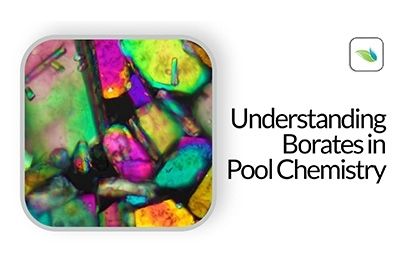Resources
Browse Our Resources
Tags: Inground Pools, Pool Chemicals, Pool Service
What do Borates do in a Swimming Pool?
What do Borates do in a Swimming Pool?
Maintaining a swimming pool requires careful balancing of chemicals to keep the water clean, clear, and comfortable. Among the many water treatment options available, borates have gained popularity as a beneficial additive for pool maintenance. But what exactly are borates, and why are they used in swimming pools? Let’s take a closer look.
What Are Borates?
Borates are compounds derived from boron, a naturally occurring element found in minerals, soil, and water. In swimming pools, borates are typically introduced in the form of boric acid, sodium borate, or borax to help manage water chemistry and improve overall water quality.
When added to pool water, borates serve multiple functions, acting as a pH buffer, an algae inhibitor, and a water conditioner. They work alongside traditional sanitizers like chlorine to enhance pool maintenance and reduce the need for frequent chemical adjustments.
How Do Borates Work in a Pool?
Borates contribute to water balance and clarity through several key mechanisms:
- pH Stabilization
- One of the biggest challenges in pool maintenance is keeping pH levels stable. Fluctuating pH can lead to cloudy water, skin irritation, premature liner failure, and reduced effectiveness of chlorine. Borates act as a pH buffer, helping to maintain a stable pH range (typically between 7.2 and 7.6). This reduces the need for constant pH adjustments with acids or bases.
- Algae Prevention
- Algae growth is a common issue in swimming pools, especially in warm climates or when chlorine levels are inconsistent. Borates help inhibit algae growth by interfering with the metabolic processes of algae cells, making it harder for them to thrive. While borates do not replace chlorine, they work in conjunction with it to keep algae under control.
- Water Softening and Comfort
- Borates give pool water a silky-smooth feel, making it more comfortable for swimmers. They also help reduce eye and skin irritation caused by fluctuating chemical levels, creating a more pleasant swimming experience.
- Enhanced Chlorine Efficiency
- By keeping pH levels stable and reducing algae growth, borates help chlorine last longer and work more efficiently. This means pool owners can use less chlorine overall while still maintaining safe and sanitized water.
- Reduced Carbonate Scale Formation
- High pH levels and calcium hardness can lead to scale buildup on pool surfaces and equipment. Borates help prevent calcium scaling by stabilizing pH and reducing the conditions that contribute to scale formation.
How to Add Borates to a Pool
If you’re considering adding borates to your pool, follow these steps:
- Test Your Water: Before adding borates, check your pool’s current borate level using a borate test strip. The ideal range for borates in a pool is typically 30–50 ppm (parts per million).
- Choose a Borate Source: Borates can be added using boric acid, sodium tetraborate (borax), or sodium borate pentahydrate. Boric acid is the most commonly used form due to its ease of application and minimal impact on pH.
- Calculate the Amount Needed: Use a pool volume calculator to determine the appropriate amount of borates required to reach the desired ppm level.
- Distribute Evenly: Slowly add borates to the pool, spreading them evenly across the water’s surface. Run the pool pump to circulate the water and allow the borates to dissolve completely.
- Monitor and Maintain: Regularly test borate levels and adjust as needed. Since borates do not break down or evaporate, they remain in the water until diluted through splash-out or water replacement.
Considerations When Using Borates
While borates offer many benefits, there are a few factors to keep in mind:
- Not a Replacement for Chlorine: Borates help maintain water balance and prevent algae, but they do not disinfect the water. A proper chlorine residual is still necessary for sanitation.
- Limited Removal Methods: The only way to remove borates from a pool is through water replacement. If over-applied, dilution is required to bring levels down.
- Pet Safety: High concentrations of borates can be harmful to pets if ingested in large amounts. If pets frequently drink pool water, consider keeping borate levels on the lower end of the recommended range.
Conclusion
Borates are a valuable addition to pool maintenance, offering benefits like pH stabilization, algae prevention, and improved water comfort. By enhancing chlorine efficiency and reducing the need for frequent pH adjustments, they simplify pool care while providing a more enjoyable swimming experience. When used correctly, borates help create a clear, balanced, and inviting pool environment with minimal effort.

